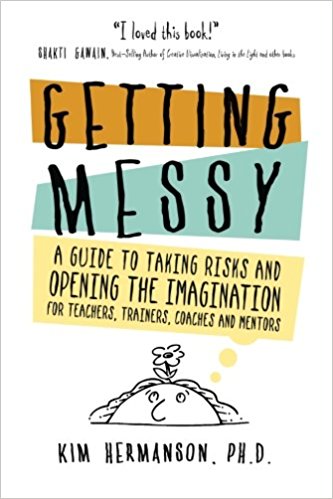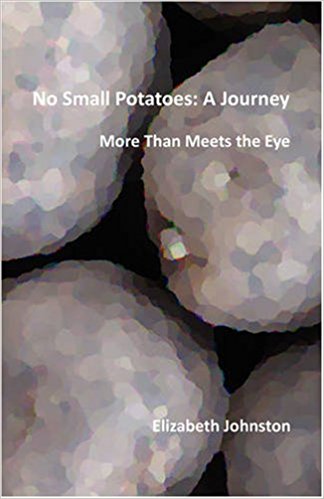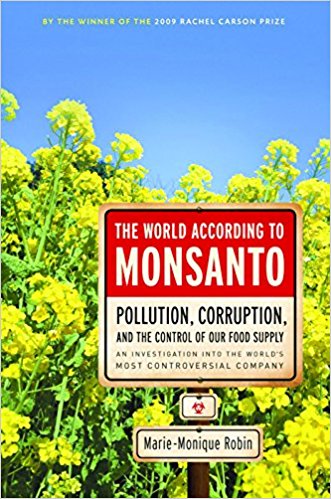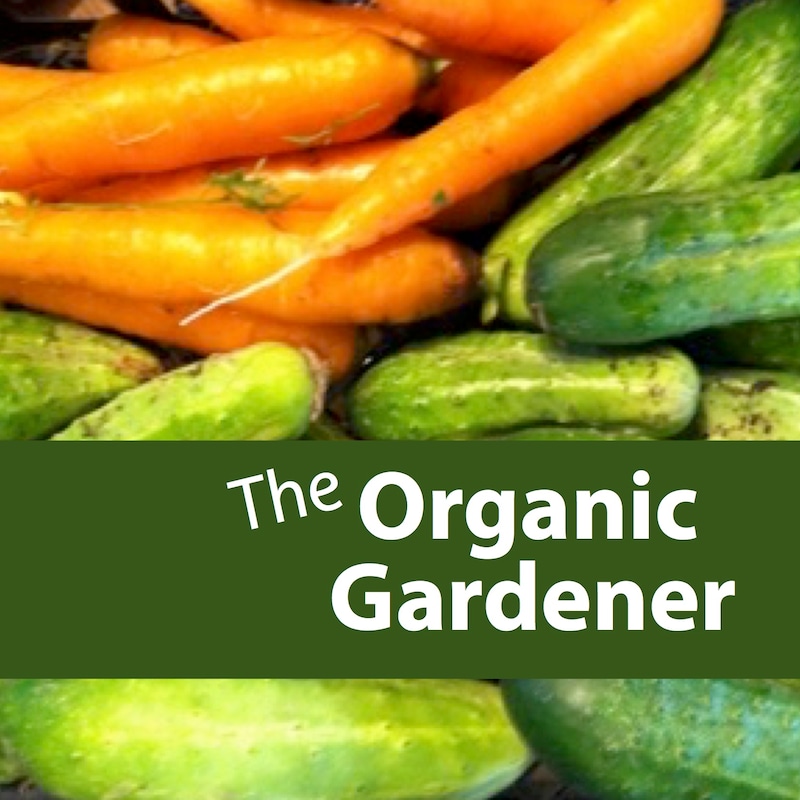
Shownotes
No Small Potatoes: A Journey More Than Meets The Eye
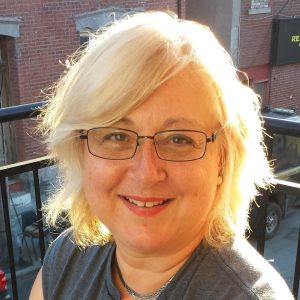
It’s the middle of March! Today I have a wonderful guest who’s going to talk about a topic that has come up many times on my show, she’s gonna talk about food and nutrition who’s written a book called No Small Potatoes: A Journey More Than Meets The Eye!
Author
Elizabeth Johntson‘s fascination with the potato brings her on an absorbing journey through many of the pivotal issues affecting how we live today. The stark reality of GMO domination, leading to the destruction of agricultural communities, the limiting of food choice and the loss of traditional knowledge and farming practices is central to the book. She skillfully demonstrates how science has lost its integrity in response to the lure of big business but points out that there is hope for small scale farmers working to preserve genetic diversity and food security. Elizabeth’s account of how native Peruvians are reclaiming their dignity and spiritual connection to the land and her call for a grassroots movement for food independence make this a captivating read. — Cait Curran, (editor of Organic Matters)
I’m excited another friend I met in a FB group it’s fun to meet colleagues and people that are near and dear friends I wouldn’t have met otherwise.
Getting Messy: A Guide to Taking Risks and Opening the Imagination for Teachers, Trainers, Coaches and Mentors
Tell us a little about yourself.
I too like the technology that allowed us to connect…. I actually went off of Facebook for quite a while, for about a year….
- who cares about status updates?
- and who had a cup of coffee?
- and some trivial things?
then I realized that’s what it’s not about. I don’t have to invest a lot of energy there and don’t pay attention to them.
Then I started getting involved in the groups in Facebook and you do really feel like you make friends!
I’m a creative writing instructor at a university. I also teach business communication
- skills for university success and
- self management techniques
It’s for people who have failed out of their program who need a refresher on strategies that are gonna help them succeed. It takes me a little bit away from the creative aspect of myself
Teaching Career
I’ve been teaching that for going on 8 years. The people who take that are not happy to be there initially. It can be stressful to dealin with people that are not happy where they are in teh process it can be quite challenging and stressful.
I needed to get back to my creative source
nurturing that in a creative way.
nurturing way
I’ve always been creative
video poem
I have come to realize how important creativity is in your life. That it shouldn’t be something that’s an add on. Or when you have time. I believe it has to be integrated to your whole life. It has to be a habit.
Recently I have been thinking about a follow- up to the book that you mentioned which is about GMOs and why they are not good for us.
No Small Potatoes: A Journey More Than Meets The Eye
Back in 2008
really what started me on my organic journey
now even thought I don’t have a garden I do buy organic as much as I can
I am more interested in the connection with the food we put in our bodies and how it will affect on our brain
i.e. our creativity
what we put in our brain and how that affects
I’m all about creativity
some of the relitazations … and the relationship between friends and creativity.
One of my all time best friends wrote a book about Creativity too, and I also, when I first became a teacher they told me you will be ok, because I have no sense of humor and that’s a big quality in a teacher but they said I had enough creativity that would be my strength. They were like you just breathe creativity you’ll make up for that. I agree with it does have to integrate into your whole life. I met so many teachers that were in my classes
Tell me about your first gardening experience? You’re in Canada right.
I’m in Montreal.
You see I totally feel like we will might meet in real life! I’ve got a long life to live.
Well, I actually don’t have my personal gardening experience, it’s not like I as a kid. My grandparents had a garden, they were from Poland and came here after the 2nd world war and they were both from rural communities. They were farmers themselves in Poland.
When they came here they opened a camper park. Near
Wasaga Beach — north of Toronto. summers growing up where from age 5. Every weekend there during the year
spent a lot of time with my grand parents.
Fruits and Vegetables
They grew
- raspberries
- blueberries
- strawberries
- pear trees
- apple trees
- plum trees
- potatoes
- cucumbers
- onions
- corn they grew for a while
- beans
on top of running the campground
2 big plots
One near our house and elsewhere on the property
So I didn’t have to do the work around it, except like going and picking for things for the meal. They would send me go out to the garden and get some cucumbers.
When I got older I thought I’m gonna start growing things myself
seeds for brussel sprouts and red peppers
grew them on top of my roof of the place that I live
first foray into growing vegetables for myself. The peppers were stunted but they were tasty!
That’s a big part of it, our Health odd store’s motto is It’s all about the Taste.
How did you learn how to garden organically?
no
they were not
they used fertilizer and pesticides
I didn’t really pay attention to what they were doing
it wasn’t until much later until that I learned the dangers of pesticides. Do you want to talk about that and your book? Is this a good place to do that.
I was taking a photography class, the last part, the instructor said we had to take a series of photos of things that hadn’t been photographed to death.
Then what popped into my head
potatoes
I hadn’t seen a lot of potatoes and I thought wouldn’t be interesting.
darkroom photography
black and white
in the end I didn’t do that, I did portraits. But I was so intrigued about that idea, about potatoes, maybe they were in the art world and I did research I just amassed papers and papers. Not as anything that I thought was going to lead to a book. I moved to montreal to torotnot
going through my things
came across this milk crate full of papers
research on the potato
should do something with his
forgoe it
this is it, Im gonna do something with this or I’m gonna throw it all out
I applied for a grant
for the writing and research
didn’t get it the first time, but I did the second time. That gave me enough money to do some more research and do some traveling!
I’m just fascinated! I’m like you got a grant to do what and what?!
I went to Peru, I talked to Alejandro Argumedo
He was my contact there. He is part of the indigenous network there to help the indigenous people become self sufficient. Able to make a living from their agriculture. He is a Canadian citizens he worked for the Candian government for many years. s
worked here for the government
introduced electronically
by another person for the book
got some money to go down to
International Potato Center
Peru is in South America right?
Yes, and when I was doing the research initially I thought potatoes came from Ireland
but in the course of my resource no they actually come from Peru. They are indigenous there, that is the only place on earth.
All the potatoes that are grown around the world once came from there.
So there are like regular white potatoes? Baker potatoes right?
Yes
White potatoes. Sweet potatoes are a different animal. So
yeah
They originated from there.
In peru
5000 naturally occurring varieties of potato
amazed by that
I went down to the potato center …
in cusco?
It’s outside the city of potatoes
where they live
They grow the potatoes there organically naturally
They created it so it was like eco-tourism
so they could stay and learn about how they husband the potato
an apothecary there,
natural remedies they make from potato…
flowers and other crops that they grow.
When you say potato flower, you mean like the flowers that grow on the plant of like potato flour you bake with?
of the potato
so it’s a way of
taking charge of their economy and their lives
doing that thru what they do best which is grow potatoes
There is an International Center in Lima
- international
- bio-technoology
- like a bank or a repository
- of potatoes
and variaities
went there and interviewed a scientist and had a tour
and Alejandro Argumedo was instrumental in repatritationg the types of potato
taken from the ketchewa
lost those varieties
He was instrumental the back the varieties. He was also he was establish the no GMO law there….in a particular area so that their potatoes in the center could be protected from the
- transfer the GMO spread
- from the wind and birds
I learned a lot about potatoes!
I have pictures in my book of the different varieties of potatoes
- all sorts of shapes
- different kinds of potatoes
- red and it actually looks like a carving of soap of a rose
- others that look like hands or feet
Incidentally the one that looks like a rose it’s got a lot of knobs on it, it’s not a smooth round or oval shape,
- indents
- round knobs
Traditionally when a man wants to marry a woman, the mans family gives the prospective bride and she has to peel it without cutting off any of those knobs.
I’m thinking they are more nutritious because you don’t have to peel them. Probably makes some art piece.
Alejandro Argumedo was invaluable in taking me around the lay of the land
I was introduced to him because
documentary
the World According to Monsanto
It’s about 20 years old now and still relevant today which is...
